
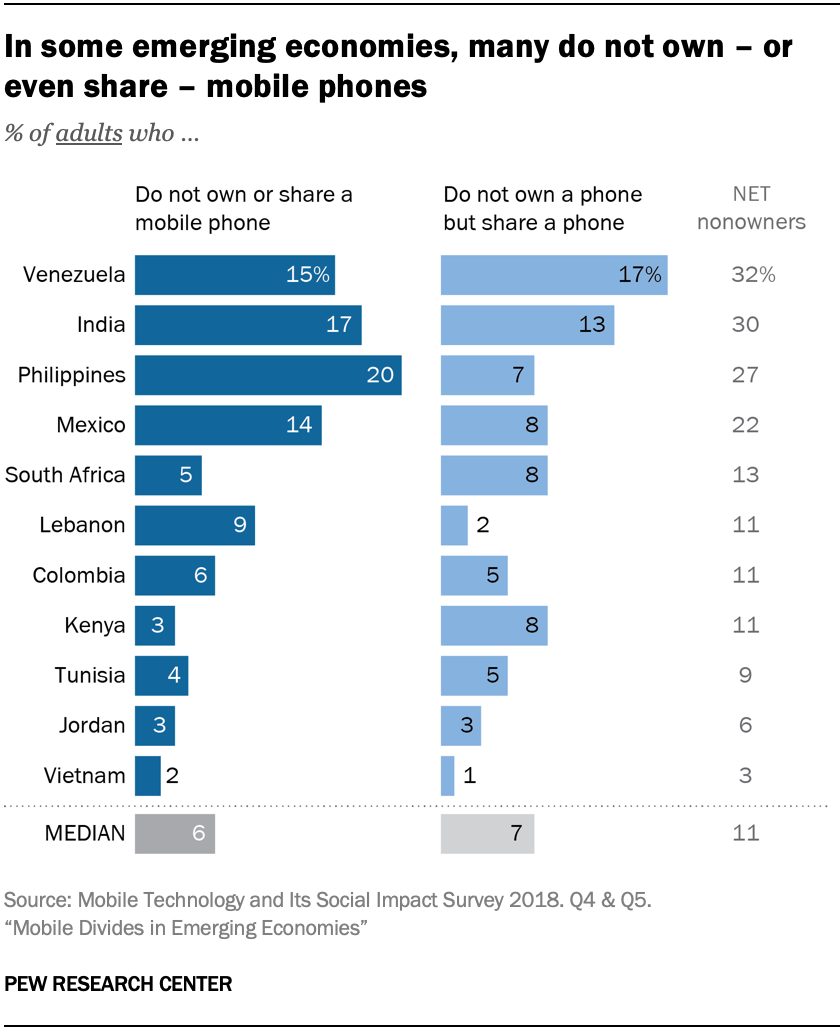
As ownership of mobile phones, especially smartphones, spreads rapidly across the globe, there are still notable numbers of people in emerging economies who do not own a mobile phone, or who share one with others. A Pew Research Center survey in 11 emerging economies finds that a median of 6% of adults do not use phones at all, and a median of 7% do not own phones but instead borrow them from others. The mobile divides are most pronounced in Venezuela (32%), India (30%) and the Philippines (27%), countries where about three-in-ten adults do not own a mobile phone.
Throughout this report, median percentages are used to help readers see overall patterns. The median is the middle number in a list of figures sorted in ascending or descending order. In a survey of 11 countries, the median result is the sixth figure on a list of country-level findings ranked in order.
We can see a lot of things on a smartphone. You can learn more about life.Woman, 40, Tunisia
At the same time, the new findings show that mobile divides even exist for phone owners. Significant numbers of owners struggle to use their phones to full advantage. A median of 46% in these countries say they frequently or occasionally have difficulties getting reliable phone connections, 37% say it can be a challenge to pay for their phones and 33% report finding places to charge their phones is a problem at least occasionally. In addition, a median of 42% report frequently or occasionally avoiding some activities on their phones because they use too much data.
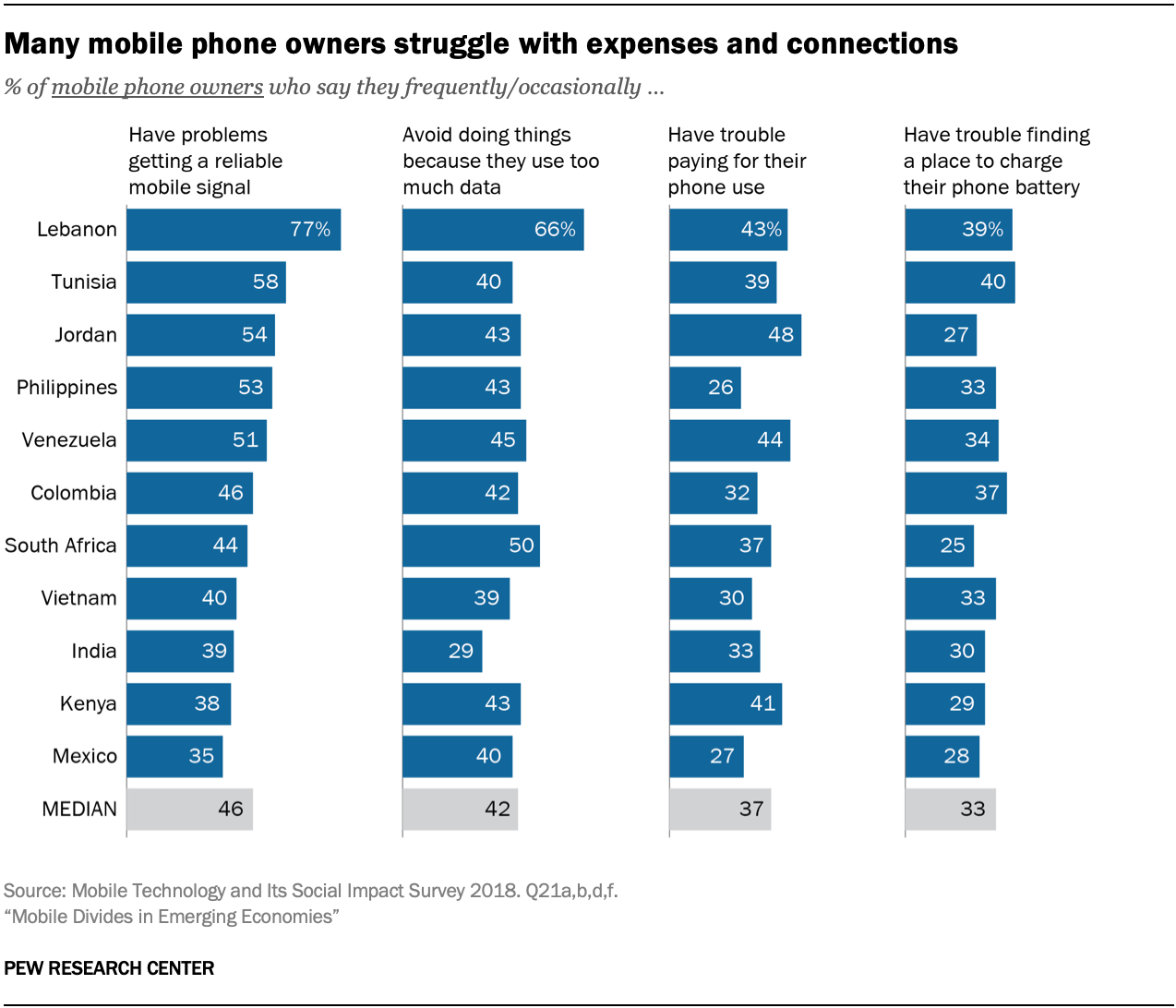
[Owning a smartphone] is not my priority. My priority is basic needs. Woman, 37, Philippines
In some countries, mobile owners’ problems are particularly striking. In Lebanon, for example, 77% of phone owners report having problems getting reliable mobile connections, and about two-thirds (66%) say they avoid doing things with their phones because those activities use too much data. In Jordan, nearly half (48%) report having trouble paying for their phone, while in Tunisia four-in-ten (40%) say it can be a challenge to find places to recharge their phones.
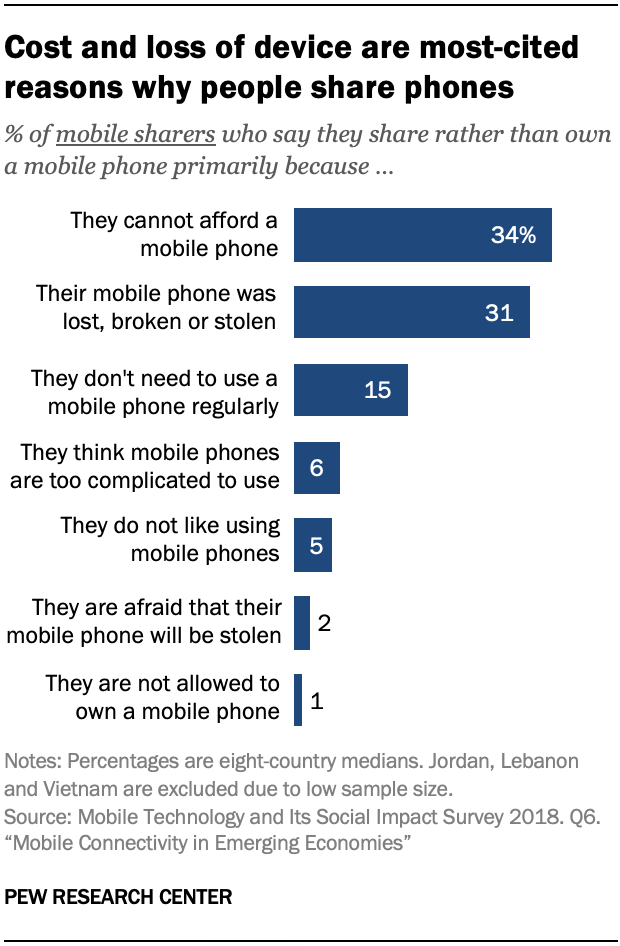 Beyond those concerns, other issues can disrupt life for a portion of phone users and sharers. Around three-quarters or more mobile phone owners in every country except India report concerns about identity theft, and around nine-in-ten or more in Mexico (95%), Colombia (94%), Tunisia (90%), South Africa (89%) and the Philippines (89%) say they are at least somewhat concerned.
Beyond those concerns, other issues can disrupt life for a portion of phone users and sharers. Around three-quarters or more mobile phone owners in every country except India report concerns about identity theft, and around nine-in-ten or more in Mexico (95%), Colombia (94%), Tunisia (90%), South Africa (89%) and the Philippines (89%) say they are at least somewhat concerned.
Mobile phone sharers, too, are often quite concerned about identity theft; outside of India and Lebanon, at least half of mobile phone sharers in every country report being very concerned about this issue. For mobile sharers, too, concerns about device security can play a role in why people choose not to own their own devices. While cost is the primary reason mobile phone sharers give for why they do not personally have a phone (a median of 34% across eight countries reports this), the second most commonly cited reason is that a previous mobile phone was lost, broken or stolen. Another 2% say they do not own their own mobile phone because of concerns that it will be stolen.
Throughout this report, there are times when we report 11-country medians and times when we report eight-country medians. This is because Pew Research Center maintains a threshold where we do not report on groups with fewer than around 100 people. In the case of both mobile phone non-users and mobile phone sharers, respectively, there are three countries that do not meet our threshold. Given this, when we talk just about mobile phone non-users or sharers, we only report on the countries with sufficient sample size, and the medians depicted will be based on eight countries. There are even fewer countries on which we can report when we want to compare across our three groups of interest – mobile phone owners, sharers and non-users – because the countries that do not meet our standards for reporting about non-users and sharers are not the same.
Additionally, because of the different experiences that non-users, sharers and owners have with mobile technology, they were often asked different questions. As a result, some questions and analyses can only be reported for certain subsets of the population. For more information on who was asked which questions, please see Appendix C.
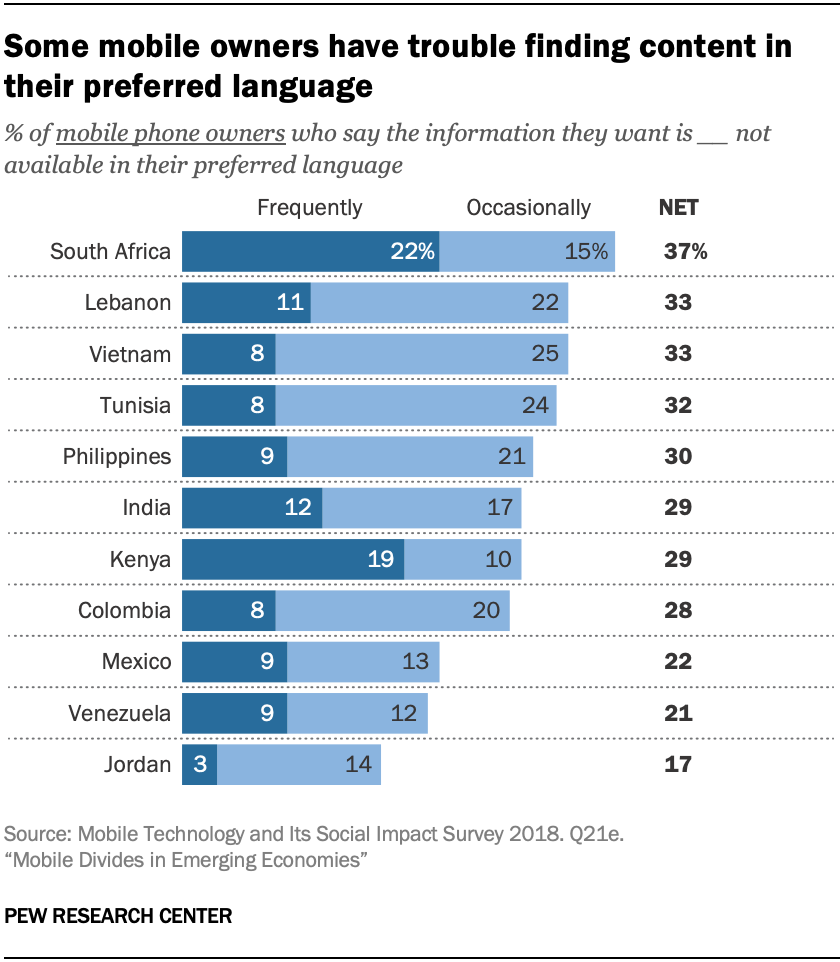 Additionally, a median of 29% of mobile owners in these 11 emerging economies say they have frequently or occasionally experienced problems finding information online in their preferred language. This problem ranges from 17% of mobile owners in Jordan to 37% in South Africa.
Additionally, a median of 29% of mobile owners in these 11 emerging economies say they have frequently or occasionally experienced problems finding information online in their preferred language. This problem ranges from 17% of mobile owners in Jordan to 37% in South Africa.
People cite a variety of reasons why they don’t own or share mobile phones
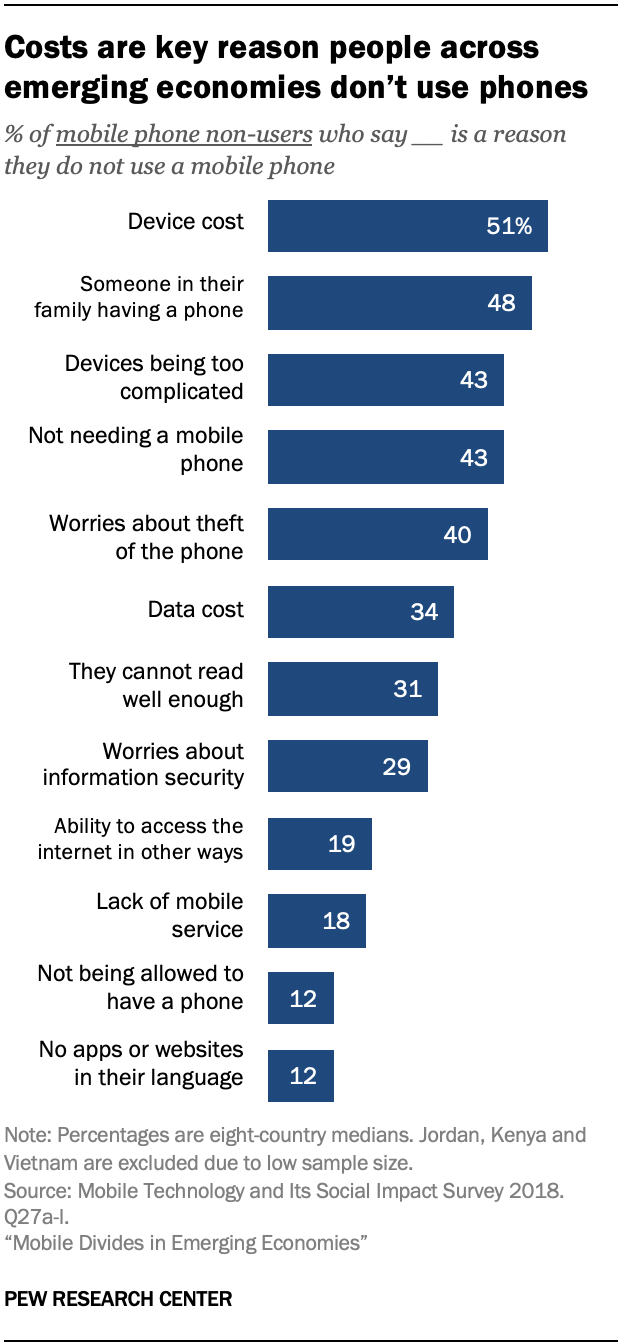 The cost of phones themselves and data plans are important factors in why people don’t own or feel compelled to share mobile phones. But costs are hardly the only deterrent.
The cost of phones themselves and data plans are important factors in why people don’t own or feel compelled to share mobile phones. But costs are hardly the only deterrent.
Among non-mobile phone users, a median of 51% across eight countries say the cost of a phone is a reason they do not have one, with non-users in Venezuela (89%) and Tunisia (71%) topping the list. A median of 34% of non-mobile users in these eight countries report that data costs are a reason. Non-users in Tunisia (63%), Venezuela (50%) and Mexico (45%) were particularly likely to cite data costs as a reason for not having a phone.
At the same time, a median of 48% of non-users in eight of these countries report the reason they personally do not have a phone is that another family member has a phone. This reason was especially likely to be cited by non-mobile phone users in the Philippines (59%), India (56%), Lebanon (49%) and Mexico (44%). This may be because these non-users can accomplish some kinds of mobile communications and other activities by relying on that other family member.
You can borrow a [family member’s] phone, right? They will say, ‘Why don’t you buy a [smart]phone like this?’ I answered, ‘I don’t have enough money.’Man, 49, Philippines
Technological literacy and general literacy issues also figure into the situation. A median of 43% of non-users say phones are too complicated for them, and 31% report they cannot read well enough to use a phone. Reading problems are particularly likely to be cited as a factor in India (49%) and Lebanon (45%).
A median of 43% of non-users in these countries say they have no need for a mobile phone. This is often the case in countries where relatively high levels of nonowners say other members of their family have mobile phones like India, Tunisia and Lebanon.
Phone hardships often come in multiples
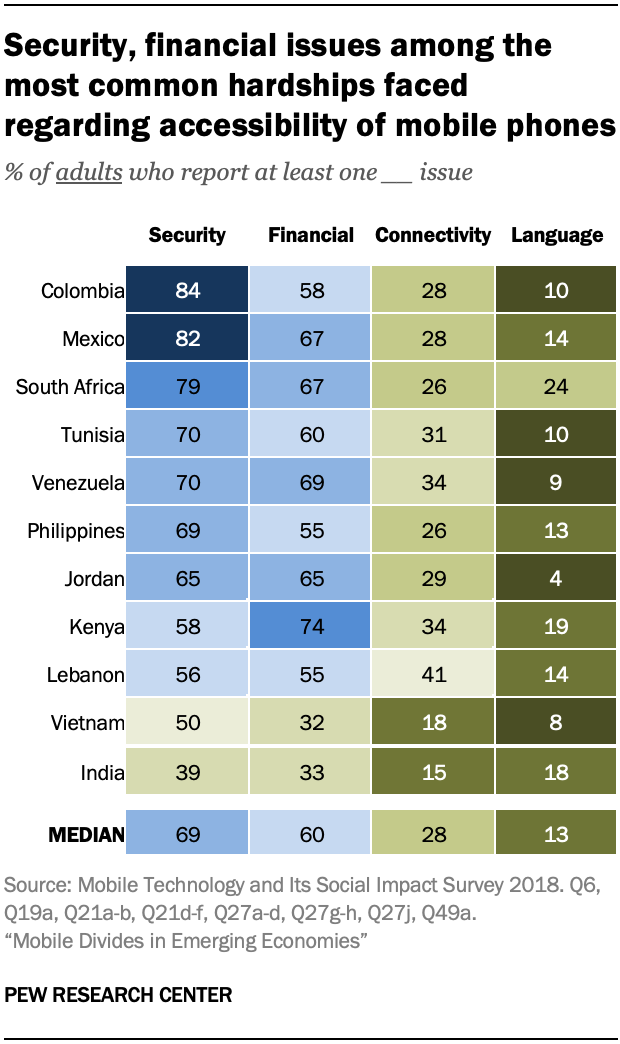 As part of the analysis, Pew Research Center created four scales related to the different kinds of hardships people might experience related to mobile phones – whether they own them, share them or don’t use them at all. The scales synthesized people’s answers related to connectivity problems, financial difficulties, language issues and security woes, flagging cases where the issue prevented or frequently impaired mobile use. (A full description of the development of the scales can be found in “Obstacles to using phones” and Appendix B.)
As part of the analysis, Pew Research Center created four scales related to the different kinds of hardships people might experience related to mobile phones – whether they own them, share them or don’t use them at all. The scales synthesized people’s answers related to connectivity problems, financial difficulties, language issues and security woes, flagging cases where the issue prevented or frequently impaired mobile use. (A full description of the development of the scales can be found in “Obstacles to using phones” and Appendix B.)
This analysis finds that security hardships are the most commonly experienced across the 11 emerging economies studied, hitting a median of 69% of adults in these countries, followed by financial struggles (a median of 60%), connectivity difficulties (28%) and language issues (13%).
Outside of India, half or more adults report facing at least one security-related hardship, meaning many are very concerned about the security of their information or the physical security of their device. These hardships are especially common in Colombia (84%), Mexico (82%) and South Africa (79%).
Financial hardships are highest in Kenya, where 74% of adults report an issue related to affording mobile devices and/or data.
Connectivity issues are most common in Lebanon, where about four-in-ten adults (41%) report a frequent difficulty with connectivity. But, few mobile users have difficulty both getting reliable service and charging their phones.
The highest rate of language issues is found in South Africa, where about a quarter (23%) report a language issue. This may be due in part to the diversity of languages found in South Africa.
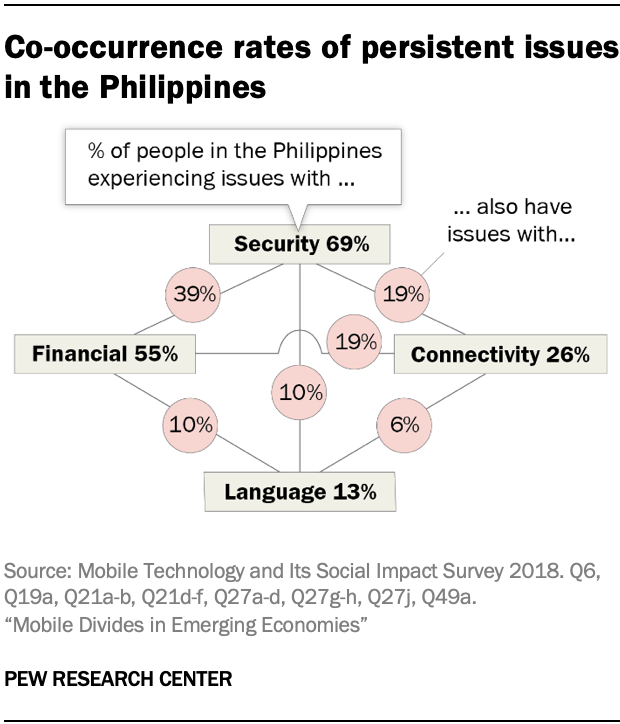 A key finding from this analysis of hardships is that barriers to mobile use do not occur in isolation. Between 27% and 67% of individuals in each country simultaneously experience two or more types of hardship, and between 1% and 7% of individuals experience all four types of hardship we asked about.
A key finding from this analysis of hardships is that barriers to mobile use do not occur in isolation. Between 27% and 67% of individuals in each country simultaneously experience two or more types of hardship, and between 1% and 7% of individuals experience all four types of hardship we asked about.
For the two most common hardships – security and financial – between 13% and 56% of individuals in each country surveyed experience both hardships concurrently. For example, around four-in-ten Filipinos (39%) simultaneously experience security and financial issues (for all country-specific numbers, see Appendix C). In fact, aside from India, roughly half or more who experience one of these issues also experiences the other (between 56% and 87%).
Some other findings from this analysis of hardships include:
- Smartphone use is associated with higher rates of security issues in most countries – that is, people who use smartphones are either more likely to report concerns about their phone being stolen or about identity theft than non-smartphone users, or they are more likely to currently share a device because their last device was stolen, lost or broken.
- Younger adults ages 18 to 29 experience higher levels of connectivity issues like poor service or problems charging their devices in several countries.
- Those who can read some English face fewer language-related issues with mobile phones in most countries, including difficulties finding online content in their preferred language or feeling there were no apps or websites in their native language.
Those living in lower-income households face more financial hurdles.
Wide range of opinions on whether non-users would like a device
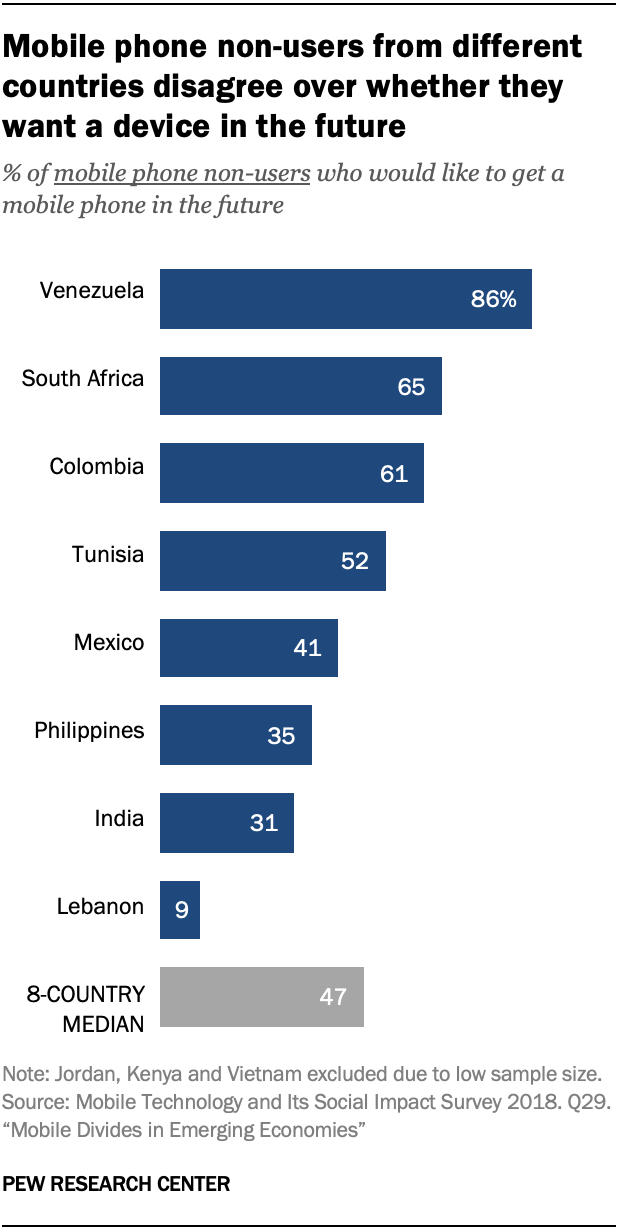 Despite these issues, a share of those who do not use phones in some of these emerging economies would like to do so. That is not universally the case, however. A median of 47% of non-users say they would like to have a mobile phone. That sentiment among non-users ranges from 86% of non-users in Venezuela to 9% in Lebanon.
Despite these issues, a share of those who do not use phones in some of these emerging economies would like to do so. That is not universally the case, however. A median of 47% of non-users say they would like to have a mobile phone. That sentiment among non-users ranges from 86% of non-users in Venezuela to 9% in Lebanon.
It is possible that the people who report wanting to get a phone in the future desire to do so in part because they believe mobile phones have been beneficial to their societies. Indeed, in six of the seven countries for which this analysis is possible, majorities of mobile phone owners and nonowners alike say mobile phones have mostly been a good thing for their society.
These are among the major findings from a Pew Research Center survey conducted among 28,122 adults in 11 countries from Sept. 7 to Dec. 7, 2018. It is part of a series of reports about the mobile landscape in emerging economies. Previous reports have covered the benefits and drawbacks people feel mobile connectivity has brought to them and their societies, perceptions about the impact of mobile phones on politics and information and the broader social networks of smartphone and social media users in these countries.
In addition to the survey, the Center conducted focus groups with diverse groups of participants in Kenya, Mexico, the Philippines and Tunisia in March 2018, and their comments are included throughout the report (see Appendix A for more information).


